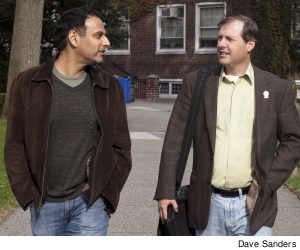The New York Police Department has monitored Muslim student groups on six CUNY campuses, part of a broad surveillance effort that was not based on evidence of criminal conduct. The police spying was first detailed in early September by veteran police reporter Leonard Levitt on his blog NYPD Confidential.
 |
According to documents obtained by Levitt and also by the Associated Press, the NYPD deployed undercover officers at Baruch and Brooklyn Colleges, and used police in its Intelligence Division Cyber Unit to monitor students at Brooklyn and Queens. In addition, police documents refer to the use of “secondary” undercovers at Hunter, CCNY, Queens and LaGuardia. Police undercovers attended events put on by Muslim student groups; the surveillance continued from at least 2003 to 2006.
PERVASIVE
These reports came in the wake of an AP investigation, published in late August, that described a vast NYPD spying operation reaching into almost every corner of the Muslim community – from mosques to restaurants to hair salons. The central role of a secret NYPD “Demographics Unit” illustrated the extent to which the surveillance had gone far beyond investigation of particular criminal acts to become a blanket investigation of entire communities.
When the NYPD denied the existence of the Demographics Unit, AP reporters posted documents from the unit online. One included a list of “Ancestries of Interest,” including “American Black Muslim.” A “Moroccan Initiative” conducted surveillance on cafés because they were frequented by people from Morocco.
“This kind of behavior is not acceptable in an academic environment, especially if it’s a fishing expedition and there is no specific, credible threat,” said Angela Burton, an associate professor at the CUNY School of Law.
On September 13, the Brooklyn College Faculty Council unanimously approved a resolution denouncing the NYPD spying on campus. The resolution also called on the NYPD to inform those they had spied upon about the nature of the information gathered.
PROFILING
“Police have the right to investigate crimes but they don’t have the right to investigate people based on their religion or their ethnic identity,” said Moustafa Bayoumi, associate professor of English at Brooklyn College and author of How Does It Feel to Be a Problem? Being Young and Arab in America.
During the September 13 meeting, Brooklyn College President Karen Gould spoke in support of the resolution and denied that the college administration had known of the spying.
“We do not in any way condone the alleged intrusion of the NYPD into campus life,” Gould said. “If true, we believe this was a violation of freedom of expression and the constitutional rights of our students, faculty, and staff.”
“The faculty resolution sent a clear message to the administration and the NYPD that this will not be tolerated,” said Acting PSC Chapter Chair Alex Vitale, a sociologist whose scholarship focuses on police conduct and civil liberties. Vitale expressed concern that the NYPD may have violated the Handschu Agreement, a set of court-ordered guidelines regulating police surveillance.
The AP reported that some CUNY personnel may have shared student records in violation of the Federal Educational Rights and Privacy Act (FERPA). Penalties for a school that violates FERPA can potentially include loss of federal funding.
Ramzi Kassem, an associate professor and director of CUNY Law School’s Immigrant and Refugee Rights Clinic, told the AP that undercover officers may also have violated a 1992 agreement between CUNY and the NYPD, which states that apart from emergency situations, police “shall enter upon CUNY campuses, buildings and other property only upon the request or approval of a CUNY official.”
CUNY Law School faculty passed a resolution on October 3 condemning the NYPD’s campus spying.
The free and open exchange of ideas is central to the life of a university, Bayoumi emphasized. “If covert surveillance occurs on a campus, it threatens to undermine that,” he said.
“It was good to see there were many professors who were quick to speak out and pass resolutions,” said Soheeb Amin, President of the Islamic Society at Brooklyn College. But for Amin, a third-year business management major, self-censorship is already a way of life.
“It happens on a daily basis,” he told Clarion. “I don’t even discuss politics and controversial topics.” As an example, Amin described sitting quietly through a class discussion earlier this semester in which fellow students debated the ethics of U.S. torture policy. “If I say torturing terrorists is cruel, then I might be seen as a terrorist sympathizer,” he explained.
INVESTIGATIONS
Jameel Haque, a doctoral student in history and an adjunct at City College, echoed these sentiments. “It’s very unnerving because you are assumed to be a criminal,” said Haque, who last year served as faculty advisor to the Muslim Student Association at Lehman.
Jeanne Theoharis, a professor of political science at Brooklyn College, says it is essential for the University’s top leadership to step up and address the situation. “The CUNY administration needs to be very forceful about this,” Theoharis said. “There have to be investigations into how this was able to happen, and policies need to be put in place to keep this from happening again.”
Faculty members denounce ‘fishing expedition.’

